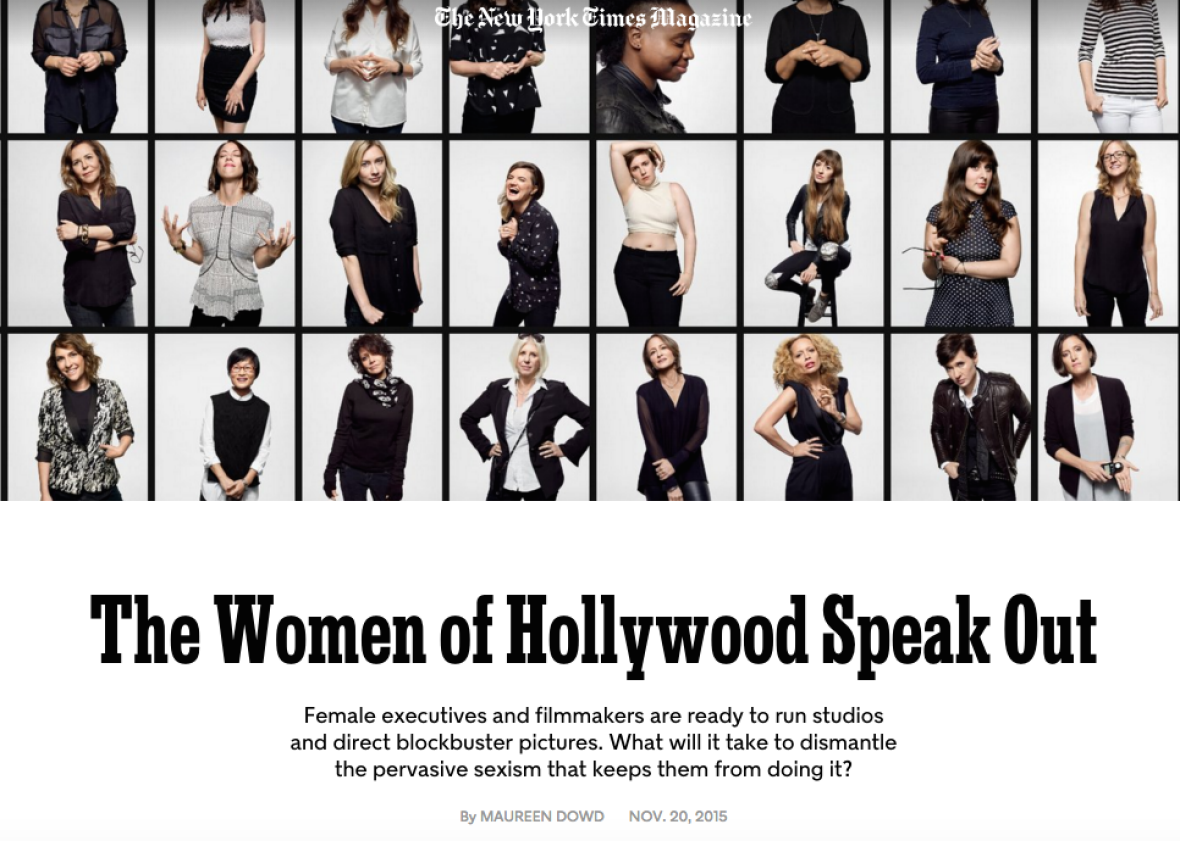The New York Times published a giant piece today about the uphill battle that female filmmakers face in Hollywood compared to their male counterparts. It’s a splashy exposé, featuring portraits of many of Hollywood’s foremost female voices. Shonda Rhimes, Lena Dunham, Catherine Hardwicke, Leslye Headland, Anjelica Huston, Geena Davis, and dozens of others show up in Maureen Dowd’s sprawling look into how backwards the industry remains when it comes to gender. (Conspicuously absent from the piece are Ava DuVernay and Elizabeth Banks, who helmed two of the biggest and most talked-about films from this year.) If you pay any attention to Hollywood news—and especially if you’re a woman—much of what Dowd reveals throughout her interview will come as no surprise to you: Report after report continues to reveal how bad things are for women, issues about which DuVernay, Jennifer Lawrence, Meryl Streep, and others have been extremely vocal, especially in the last year. And Dowd’s piece is more than a bit all-over-the-place, reading like a “greatest hits” of choice quotes from fascinating people, but never staying on one point too long.
But the piece does serve to demonstrate the sheer scope of sexism and misogyny in Hollywood, and learning that a “powerful [male] Hollywood player” told Dowd to “Call some chicks” when she reached out for comment on the piece will make even the most jaded among us feel a tinge of rage. Below are a few of the most revealing takeaways from “The Women of Hollywood Speak Out.”
The boys’ club culture is so pervasive that it’s embedded in the very language of the filmmaking world.
One of the more perceptive quotes comes from, of all people, Alec Baldwin. He notes that the directing world has always been described in “paramilitary” terms: ‘‘They call it shooting. Its groupings are called units. They communicate on walkie-talkies. The director is the general. There is still the presumption that men are better designed for the ferocity and meanness that the job often requires.” This mentality, along with the presumption that women are more “emotional” and thus aren’t equipped to helm anything other than so-called “chick flicks,” helps explain progress on this front has been so slow.
Part of the problem may be foreign markets’ resistance to female directors.
The more Hollywood angles its blockbusters toward foreign audiences, the harder it is for women to be considered to star in and/or direct big budget films. Apparently, women are perceived as less valuable than men in foreign markets, not unlike the way they are here in the U.S. One female studio head told Dowd, ‘‘The moment you mention it’s a female director to foreign companies, you can see the eyes roll.”
Hollywood likes its women “chained to a wall.”
Filmmaker Karyn Kusama (Jennifer’s Body) called the above situation the “No. 1 script motif” she’s seen throughout her career. Other horrifyingly sexist ideas that were illuminated: Studio heads don’t want to be reminded of their nagging mothers or girlfriends or wives at home while at work; they only like their female colleagues young and sexy (‘‘It never hurts to have a great pair of legs in Hollywood,” said one female Sony producer); and speaking of young and sexy, male dominance in Hollywood really just comes down to sex, sex, and “maintaining an erection”: “Men want to walk into the boardroom and take credit for a muscular movie because it reflects on their own muscularity,” said an anonymous actress.
Hollywood men are just as unimaginative when it comes to encouraging female perspectives as they are when it comes to choosing hats.
This isn’t exactly news, but boy, do male directors love their baseball caps. Dowd paints a picture of “young guys in baseball caps who remind older guys in baseball caps,” and calls Josh Trank, director of last summer’s huge flop Fantastic Four, a “young guy in a Bubba Gump hat.”
Read more in Slate:
- Three Sundance Filmmakers on Why There Aren’t More Women Behind the Scenes
- The Founders of a New Hollywood Diversity Program on How to Make Film and TV More Diverse
- Project Greenlight Revealed Exactly Why Hollywood Still Has a Diversity Problem
